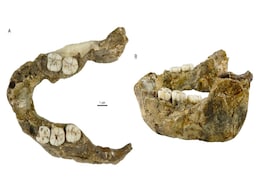New Human Species
- All
- News
-

1.4 Million-Year-Old Jaw Identified as New Paranthropus Species in South Africa
- Friday February 7, 2025
- Written by Gadgets 360 Staff
A fossil jawbone discovered in South Africa, initially misclassified, has been identified as a new species, Paranthropus capensis. Using advanced 3D imaging, researchers found that the jaw’s structure and molars differed significantly from known Homo and Paranthropus species. The findings suggest that at least two Paranthropus species coexisted a...
-
 www.gadgets360.com
www.gadgets360.com
-

Human Hunting More Responsible for Kangaroo Extinction than Climate Change
- Saturday January 11, 2025
- Written by Gadgets 360 Staff
A recent study of ancient kangaroo teeth contradicts previous beliefs that climate change caused their extinction. By examining the wear on teeth, researchers found that kangaroos had flexible diets, which made them resilient to climate shifts. This evidence suggests that human hunting activities, rather than dietary limitations, played a more sign...
-
 www.gadgets360.com
www.gadgets360.com
-

New Species Discovered in Peru’s Alto Mayo Region, Including Blob-Headed Catfish
- Wednesday January 1, 2025
- Written by Gadgets 360 Staff
A recent biodiversity survey in Peru’s Alto Mayo region led to the discovery of 27 new species, including a unique blob-headed bristlemouth armored catfish. The survey, conducted by Conservation International, uncovered new mammals, amphibians, fish, butterflies, and plants, emphasizing the area’s ecological importance. Researchers used innovat...
-
 www.gadgets360.com
www.gadgets360.com
-

Homo Juluensis Discovered: A New Chapter in Middle Pleistocene Human Evolution
- Tuesday December 3, 2024
- Written by Gadgets 360 Staff
A newly discovered species, Homo juluensis, has been identified from fossils found in China, dating back between 220,000 and 100,000 years ago. The fossils, unearthed at Xujiayao and Xuchang, feature large skulls with a unique blend of Neanderthal, Denisovan and modern human traits. Researchers, including Christopher Bae from the University of Hawa...
-
 www.gadgets360.com
www.gadgets360.com
-

California Announces Plan to Protect Joshua Trees from Wildfires and Climate Change Threats
- Monday December 2, 2024
- Written by Gadgets 360 Staff
A new plan released by California's Department of Fish and Wildlife outlines strategies to protect Joshua trees from threats including wildfires, human development and climate change. The plan includes land conservation, wildfire management and relocation of trees where necessary. It aims to safeguard the species for the future amid rising temperat...
-
 www.gadgets360.com
www.gadgets360.com
-

Octopuses May Become Earth's Next Dominant Species if Humans Go Extinct, Claims New Study
- Monday November 18, 2024
- Written by Gadgets 360 Staff
Experts believe octopuses could rise as the dominant species on Earth if humans were to face extinction, due to factors like climate change or war. With their advanced intelligence, adaptability, and ability to use tools, octopuses are seen as prime candidates for developing complex societies. While unlikely to fully adapt to land life, they could ...
-
 www.gadgets360.com
www.gadgets360.com
-

Australopithecines May Have Used Tools Over 3 Million Years Ago, Reveals New Study
- Thursday November 14, 2024
- Written by Gadgets 360 Staff
A recent study reveals that australopithecines, including Lucy’s species, may have used tools over 3 million years ago. By examining muscle attachment sites on their hand bones, researchers found traits indicating a high degree of dexterity. This discovery could redefine our understanding of the timeline for tool use, suggesting that early human ...
-
 www.gadgets360.com
www.gadgets360.com
-

World’s Tree Species at Risk of Extinction, Claims New Study
- Tuesday October 29, 2024
- Written by Gadgets 360 Staff
A recent report has revealed that more than 38% of tree species globally are at risk of extinction, with human activities like deforestation and disease contributing significantly to their decline. The findings were presented at the UN COP16 biodiversity summit in Colombia, where world leaders are discussing strategies to protect natural ecosystems...
-
 www.gadgets360.com
www.gadgets360.com
-

Ancient Humans Remained in Frigid Central Europe During Last Ice Age, New Study Reveals
- Friday October 18, 2024
- Written by Gadgets 360 Staff
A recent study has revealed that some ancient humans did not retreat from Central Europe during the last ice age. Instead, they adapted to the harsh conditions, similar to species like brown bears and wolves. Led by Oxala García-Rodríguez from Bournemouth University, the study utilised genetic data to show how humans thrived in frigid climates, w...
-
 www.gadgets360.com
www.gadgets360.com
-

Hidden Heat-Tolerant Corals Can Save Great Barrier Reef, New Research Shows
- Tuesday September 24, 2024
- World News | Melissa Naugle, Emily Howells, Line K Bay, The Conversation
Just as individual humans handle stress differently, so do corals. Even coral colonies of the same species, growing side by side, vary in their tolerance to pressures such as heatwaves.
-
 www.ndtv.com
www.ndtv.com
-

Human Immune System Might Have Evolved From the Ancient Microbe ‘Asgard’, Claims Study
- Wednesday September 4, 2024
- Written by Gadgets 360 Staff
The immune system found in humans and all other complex life forms might have evolved from an ancient species of microbes known as Asgard archaea, as per new research. These microbes, which are believed to have emerged around 2 billion years ago, have provided insight into the origins of vital proteins that help organisms fend off viruses.
-
 www.gadgets360.com
www.gadgets360.com
-

Will Men Be Wiped Out By A Fading Y Chromosome? What Current Science Reveals
- Saturday August 24, 2024
- Science | Edited by Nikhil Pandey
Y chromosome has significantly reduced in size over millions of years, raising the possibility of evolving new sex-determination systems and the emergence of different human species in the distant future.
-
 www.ndtv.com
www.ndtv.com
-

"Enormous Concern": WHO On Human Cases Of Bird Flu
- Thursday April 18, 2024
- World News | Agence France-Presse
The World Health Organization voiced alarm Thursday at the growing spread of H5N1 bird flu to new species, including humans, who face an "extraordinarily high" mortality rate.
-
 www.ndtv.com
www.ndtv.com
-

Archaeologists Discover 1.8 Million-Year-Old Human Tooth In Georgia: Report
- Saturday September 10, 2022
- World News | Edited by Diksha Rani
Archeologists have discovered a tooth in Georgia belonging to an early species of human believed to be 1.8 million years old.
-
 www.ndtv.com
www.ndtv.com
-

Humans Have Been Walking on Two Legs Since 7 Million Years, Fossil Analysis Reveals
- Thursday August 25, 2022
- Edited by Richa Sharma
In a new study, a team of researchers compared the discovered fossils from the Djurab Desert in Chad with the equivalent bones from humans, gorillas, and chimpanzees. They looked at the mechanics of the bones and how they were used by the species. The team concluded habitual bipedalism to be the most likely scenario.
-
 www.gadgets360.com
www.gadgets360.com
-

1.4 Million-Year-Old Jaw Identified as New Paranthropus Species in South Africa
- Friday February 7, 2025
- Written by Gadgets 360 Staff
A fossil jawbone discovered in South Africa, initially misclassified, has been identified as a new species, Paranthropus capensis. Using advanced 3D imaging, researchers found that the jaw’s structure and molars differed significantly from known Homo and Paranthropus species. The findings suggest that at least two Paranthropus species coexisted a...
-
 www.gadgets360.com
www.gadgets360.com
-

Human Hunting More Responsible for Kangaroo Extinction than Climate Change
- Saturday January 11, 2025
- Written by Gadgets 360 Staff
A recent study of ancient kangaroo teeth contradicts previous beliefs that climate change caused their extinction. By examining the wear on teeth, researchers found that kangaroos had flexible diets, which made them resilient to climate shifts. This evidence suggests that human hunting activities, rather than dietary limitations, played a more sign...
-
 www.gadgets360.com
www.gadgets360.com
-

New Species Discovered in Peru’s Alto Mayo Region, Including Blob-Headed Catfish
- Wednesday January 1, 2025
- Written by Gadgets 360 Staff
A recent biodiversity survey in Peru’s Alto Mayo region led to the discovery of 27 new species, including a unique blob-headed bristlemouth armored catfish. The survey, conducted by Conservation International, uncovered new mammals, amphibians, fish, butterflies, and plants, emphasizing the area’s ecological importance. Researchers used innovat...
-
 www.gadgets360.com
www.gadgets360.com
-

Homo Juluensis Discovered: A New Chapter in Middle Pleistocene Human Evolution
- Tuesday December 3, 2024
- Written by Gadgets 360 Staff
A newly discovered species, Homo juluensis, has been identified from fossils found in China, dating back between 220,000 and 100,000 years ago. The fossils, unearthed at Xujiayao and Xuchang, feature large skulls with a unique blend of Neanderthal, Denisovan and modern human traits. Researchers, including Christopher Bae from the University of Hawa...
-
 www.gadgets360.com
www.gadgets360.com
-

California Announces Plan to Protect Joshua Trees from Wildfires and Climate Change Threats
- Monday December 2, 2024
- Written by Gadgets 360 Staff
A new plan released by California's Department of Fish and Wildlife outlines strategies to protect Joshua trees from threats including wildfires, human development and climate change. The plan includes land conservation, wildfire management and relocation of trees where necessary. It aims to safeguard the species for the future amid rising temperat...
-
 www.gadgets360.com
www.gadgets360.com
-

Octopuses May Become Earth's Next Dominant Species if Humans Go Extinct, Claims New Study
- Monday November 18, 2024
- Written by Gadgets 360 Staff
Experts believe octopuses could rise as the dominant species on Earth if humans were to face extinction, due to factors like climate change or war. With their advanced intelligence, adaptability, and ability to use tools, octopuses are seen as prime candidates for developing complex societies. While unlikely to fully adapt to land life, they could ...
-
 www.gadgets360.com
www.gadgets360.com
-

Australopithecines May Have Used Tools Over 3 Million Years Ago, Reveals New Study
- Thursday November 14, 2024
- Written by Gadgets 360 Staff
A recent study reveals that australopithecines, including Lucy’s species, may have used tools over 3 million years ago. By examining muscle attachment sites on their hand bones, researchers found traits indicating a high degree of dexterity. This discovery could redefine our understanding of the timeline for tool use, suggesting that early human ...
-
 www.gadgets360.com
www.gadgets360.com
-

World’s Tree Species at Risk of Extinction, Claims New Study
- Tuesday October 29, 2024
- Written by Gadgets 360 Staff
A recent report has revealed that more than 38% of tree species globally are at risk of extinction, with human activities like deforestation and disease contributing significantly to their decline. The findings were presented at the UN COP16 biodiversity summit in Colombia, where world leaders are discussing strategies to protect natural ecosystems...
-
 www.gadgets360.com
www.gadgets360.com
-

Ancient Humans Remained in Frigid Central Europe During Last Ice Age, New Study Reveals
- Friday October 18, 2024
- Written by Gadgets 360 Staff
A recent study has revealed that some ancient humans did not retreat from Central Europe during the last ice age. Instead, they adapted to the harsh conditions, similar to species like brown bears and wolves. Led by Oxala García-Rodríguez from Bournemouth University, the study utilised genetic data to show how humans thrived in frigid climates, w...
-
 www.gadgets360.com
www.gadgets360.com
-

Hidden Heat-Tolerant Corals Can Save Great Barrier Reef, New Research Shows
- Tuesday September 24, 2024
- World News | Melissa Naugle, Emily Howells, Line K Bay, The Conversation
Just as individual humans handle stress differently, so do corals. Even coral colonies of the same species, growing side by side, vary in their tolerance to pressures such as heatwaves.
-
 www.ndtv.com
www.ndtv.com
-

Human Immune System Might Have Evolved From the Ancient Microbe ‘Asgard’, Claims Study
- Wednesday September 4, 2024
- Written by Gadgets 360 Staff
The immune system found in humans and all other complex life forms might have evolved from an ancient species of microbes known as Asgard archaea, as per new research. These microbes, which are believed to have emerged around 2 billion years ago, have provided insight into the origins of vital proteins that help organisms fend off viruses.
-
 www.gadgets360.com
www.gadgets360.com
-

Will Men Be Wiped Out By A Fading Y Chromosome? What Current Science Reveals
- Saturday August 24, 2024
- Science | Edited by Nikhil Pandey
Y chromosome has significantly reduced in size over millions of years, raising the possibility of evolving new sex-determination systems and the emergence of different human species in the distant future.
-
 www.ndtv.com
www.ndtv.com
-

"Enormous Concern": WHO On Human Cases Of Bird Flu
- Thursday April 18, 2024
- World News | Agence France-Presse
The World Health Organization voiced alarm Thursday at the growing spread of H5N1 bird flu to new species, including humans, who face an "extraordinarily high" mortality rate.
-
 www.ndtv.com
www.ndtv.com
-

Archaeologists Discover 1.8 Million-Year-Old Human Tooth In Georgia: Report
- Saturday September 10, 2022
- World News | Edited by Diksha Rani
Archeologists have discovered a tooth in Georgia belonging to an early species of human believed to be 1.8 million years old.
-
 www.ndtv.com
www.ndtv.com
-

Humans Have Been Walking on Two Legs Since 7 Million Years, Fossil Analysis Reveals
- Thursday August 25, 2022
- Edited by Richa Sharma
In a new study, a team of researchers compared the discovered fossils from the Djurab Desert in Chad with the equivalent bones from humans, gorillas, and chimpanzees. They looked at the mechanics of the bones and how they were used by the species. The team concluded habitual bipedalism to be the most likely scenario.
-
 www.gadgets360.com
www.gadgets360.com
















